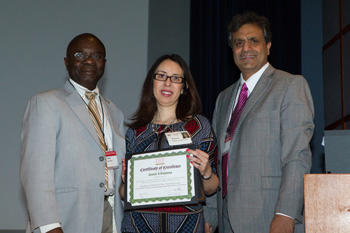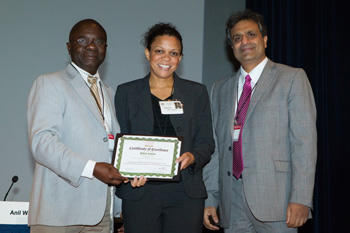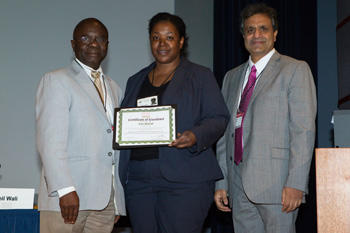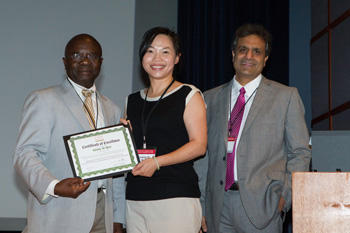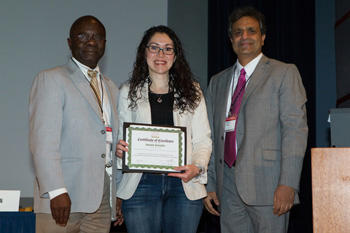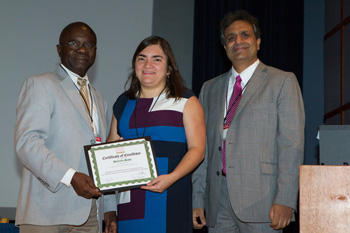Program Spotlight: 2014 Professional Development Workshop Scientific Poster Winners
, by CRCHD Staff
As part of its 2014 Professional Development Workshop, CRCHD invited participants to participate in a competitive, interactive poster session - providing an opportunity for CURE scholars to display and present research findings, and intent for future research.
Scientific topics covered a wide range of cancer health disparities-related issues. Highlights from the session included novel cancer health disparities scientific, clinical, and training efforts; cancer health disparities applications in the community; and policy implications of various approaches across the cancer control continuum among diverse populations.
All posters were judged by the 2014 Professional Development Workshop’s CRCHD Poster Review and Judging Committee. Participants were also asked to explain their research and were subject to additional questions from the panel of judges.
The poster winners were selected under three research types:
- Basic Science,
- Community-Based Participatory Research, and
- Clinical Research.
The 2014 Professional Development Workshop is one of the program offerings under the Diversity Training Branch (DTB) at CRCHD. DTB leads NCI’s training of students and investigators from backgrounds typically underrepresented in the biomedical sciences to join the next generation of competitive researchers in cancer and cancer health disparities research.
Winners of the 2014 CRCHD Professional Development Workshop Poster Session are presented below:
Basic Science
First Place: Jessie Villanueva, Ph.D.,The Wistar Institute
Title: MEK2 mutations and BRAF amplification leads to sustained MAPK signaling, S6K activation and resistance to BRAF and MEK inhibitors
Findings: Dr. Villanueva and team found that the therapeutic efficacy of MEK and BRAF inhibitors is limited by the emergence of drug resistance. As a result, it is critical to understand all mechanisms of resistance and develop strategies to overcome them. MEK inhibitors have the potential to treat BRAF-mutated melanoma, for example. These findings contribute to the study of the genetics of cancer and of resistance that lead to effective, targeted combination therapies that match patients’ genetic profiles and the tumor’s molecular information.
Second Place: Nikia Laurie, Ph.D., Northwestern Feinberg School of Medicine
Title: Elucidating the role of miRNA-31 in Retinoblastoma
Findings: The aim of the study was to identify key genetic factors that can be targeted therapeutically for effective treatment of retinoblastoma (eye cancer). Laurie is studying tumor suppressor miRNA-3to observe any aberrant miRNA regulation on eye cancer, and its potential effectiveness of having an anti-metastatic role and serving as a potential therapeutic target. She is currently testing these miRNAs in an orthotopic retinoblastoma animal model.
Third Place: Donita Brady, Ph.D., Duke University
Title: Copper is required for oncogenic BRAF signaling and tumorigenesis
Findings: Brady’s research focused on BRAF mutations and the role the protein plays in regulating cell growth. Brady found that copper regulates the intensity of the RAF-MEK-ERK MAPK signaling pathway through a novel interaction, which can be significant in inhibiting tumor growth.
Community-Based Participatory Research (CBPR)
First Place: Lisa Wigfall, Ph.D., University of South Carolina
Title: Pap test beliefs and cervical cancer screening adherence among U.S. women 21-65 years old: Analysis of the Health Information National Trends Survey (HINTS 4, Cycle 2) data
Findings: Through a community outreach program, Wigfall aimed to increase cervical cancer screening and awareness. She found that women who already believed that the Pap test was very or pretty successful at early detection of cervical cancer were significantly more likely to adhere to recommendations to get screened for cervical cancer screening via the Pap test.
Second Place: Kuang-Yi Wen, Ph.D., Fox Chase Cancer Center
Title: Mapping the supportive care needs and health-related quality of life among Chinese American breast cancer survivors: a mixed-method approach
Findings: Wen’s outreach focus was to investigate the needs of Chinese American breast cancer survivors in Pennsylvania. Through surveys and in-depth interviews, Wen found that lower household income, unemployment status, and higher unmet psychosocial needs were associated with lower health-related quality of life among these women. She also found that there is the constant fear of recurrence intertwined with feeling disempowered, both associated with the lack of access to culturally relevant and linguistically appropriate survivorship information. These findings can help pave stronger support systems from an institutional to a personal care level.
Third Place: Crystal Lumpkins, Ph.D., University of Kansas Medical Center
Title: Marketing a Healthy Mind, Body and Soul – An Analysis of How African American Men View the Church as a Social Marketer and Health Promoter of Colorectal Cancer Risk and Prevention
Findings: Lumpkins explored how African American men in the Midwest could be motivated to take action in colorectal cancer prevention by their church serving as health promoters. Among the target population, Lumpkins found that although participants trusted the church and pastor as promoters of this type of health information, they believed that the promotion should be co-sponsored with a reputable health organization such as the National Institutes of Health. This finding has partnership implications for prevention related community outreach efforts.
Clinical Research
First Place: Susana Gonzalez, M.D., Mount Sinai Medical Center
Title: Endoscopic Multispectral Imaging for the Early Detection of Gastric Neoplasia
Findings: Gonzalez and her team developed a Modular Video Endoscope (MVE) and a battery operated high-resolution microendoscope (HRME) to be used in detecting early dysplasia in the gastrointestinal tract. Early dysplasia is considered both as a carcinoma precursor and a marker of high cancer risk for the site at which it is found. Through an ex-vivo study, Gonzalez found that the MVE can be used to identify suspicious regions of tissue in the stomach for further interrogation, enabling early detection and treatment.
Second Place: Marcela Maus, M.D., Ph.D., University of Pennsylvania
Title: Next-generation T cell therapies to fight cancer
Findings: Dr. Maus investigated the pre-clinical and clinical development of new forms of genetically-modified T cells to treat different types of cancer. Specifically, her lab developed chimeric antigen receptor T cells to target glioblastoma (brain cancer), mesothelioma (tumor of the tissue), pancreatic cancer, ovarian cancer, prostate cancer, and myeloma, and will be initiating clinical trials in patients with these cancers over the next year.
* All photos by Daniel Soñé Photography
Resources:
- Learn more about CRCHD's CURE program.
- Learn more about CRCHD's Diversity Training branch.
